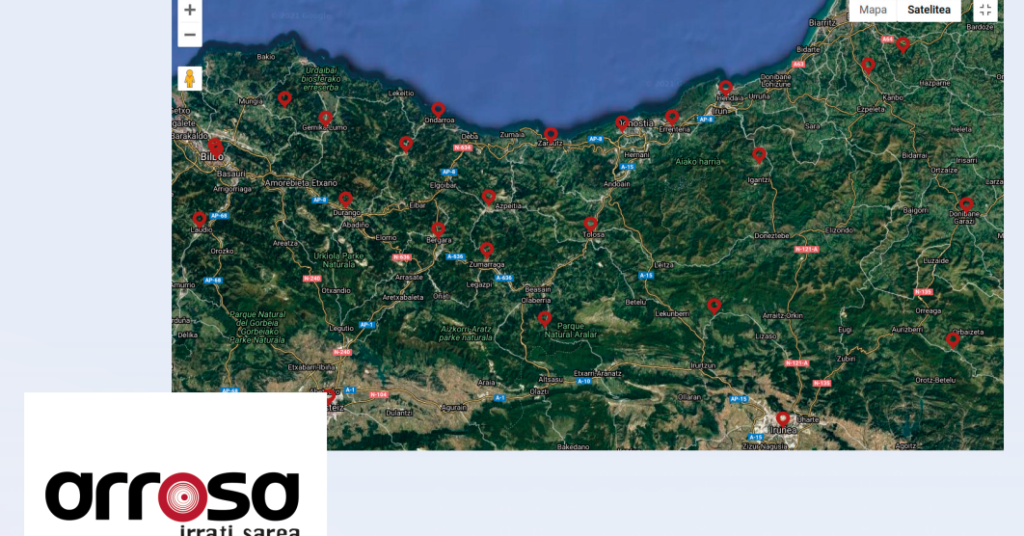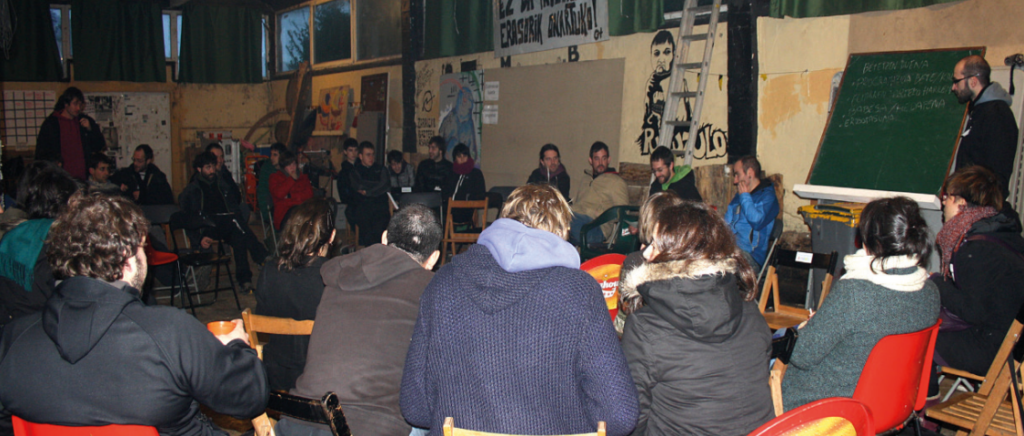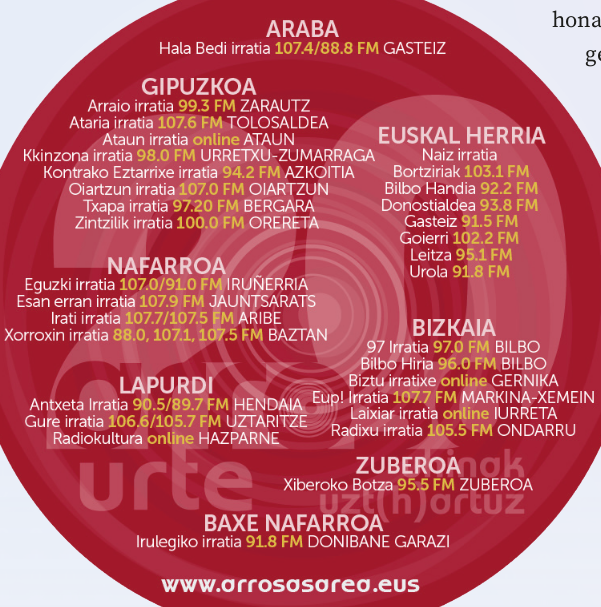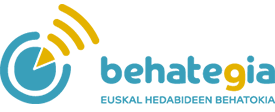The ARROSA network is a network of Basque radio stations in Euskal Herria, currently composed of 25 radios and with a trajectory of 20 years. The network has radio stations of all kinds, mostly free-radios, but also municipal stations, Internet radios and community radios. The main common element of the network of radio stations from 7 countries of the Basque Country is the language, the Basque language. We share content in Basque between the broadcasters of the network and through this exchange the broadcasters of the broadcasters of the network are completed.
We also produced a two-hour production magazine from Monday to Friday, called Cebrabidea, in which broadcasters participate and news, interviews, collaborations, etc. We"ve also developed an app for mobiles, ArrosApp, from which we can hear signals from network broadcasters in one click. In the last year several podcasts have been added to the network, both so that radio stations can offer their content on the grid and so that they have a greater dissemination or projection. In 2021, as mentioned at the beginning, Arrosa is 20 years old and we have produced a documentary (coming soon) that reflects this journey, in which its experiences, the creators of the network, the coordinators and the voice of Zebrabidea are reported.

A little bit of history
The Arrosa network was presented 20 years ago at a meeting of radio stations organized in 2001 in the framework of the Euskal Herria Zuzenean Festival (LER). This EHZ festival was held in the town of Arrosa (Lower Navarre) and hence its name. Although birth is considered on May 31, we must go back in time to find the roots of Arrosa. The Irulegi radio organized, together with other community broadcasters in the Aquitaine region, a series of meetings to promote the sharing, debate and relationship between them. These meetings were also attended by several broadcasters from the South and soon realized the importance of uniting the small broadcasters.
Spring 2001 Herria Mugi! cooperation with the members of the Joxemi Zumalabe III Foundation. the meetings took place in the Alavesa town of Barria, where agents and groups from different areas joined. In these meetings there was also a space for the media and radio stations. In these meetings several free radio stations from Euskal Herria joined, and the lack of coordination and collaboration among the broadcasters, some of the biggest deficiencies, was evident. Well, in order to address these deficiencies, the members of Joxemi Zumalabe refocused after these meetings in preparing the site to form a network of radio stations in the Basque Country. Thus, in Hernani it was held in early June 2001 what could be called the first assembly and at the end of June the Rose Network was presented at the LER Festival.
The bases of the Arrosa Network that were presented in that creation were:
- Meeting point of the various radio stations throughout the Basque Country.
- Respect for the nature of each broadcast.
- Promote cooperation between radio stations.
- Share technological resources/knowledge.
- Reference area Basque Country.
- Euskera as the axis and base.
In addition to the meeting point of radio stations, the Arrosa network decided to set up a production center in which a daily production magazine would begin: “Rainbow Balcony”. The exchange of radio programs among broadcasters of the network began, as well as the equitable joint broadcast, so that the network of radio stations in Basque from all over the Basque Country began to materialize.
First turning point: economic problems
The Arrosa network brought to the Basque radio a frexo air, not only by the beginning of new content and joint broadcasts between broadcasters, but also by the commitment to the birth of new broadcasters and to the creation of a new reference for the public interested in starting a broadcaster. The exchange of technological know-how also contributed significantly to many radio stations, for example, until then the Internet broadcast was not widespread on the radio stations of the Basque Country, and the exchange of technical knowledge allowed broadcasters to acquire the knowledge necessary to broadcast their FM signals also by streaming. Another notable example was the availability of space for the exchange of radio programs, the website of the Arrosa network. In it, before the word podcast began to be used in our environment, radio programs from the broadcast network were already offered to listen to the letter.

It was agreed to open the production center in the Parque Cultural Martín de Ugalde de Andoain, where a kind of writing was located, as well as a study for the magazine “Balcony of the Rainbow”. With the illusion and enthusiasm of the beginning of the projects, the Arrosa network started its journey, defining the financial mechanisms necessary for the project itself to be carried out and deducing that the revenues that could be derived from them would generate decent working conditions. In this way, two people were hired to lead the magazine and another to coordinate. 3 people, 3 salaries, and the rental of the production site, which is important. When subsidies started to decrease and there were no other permanent and relevant sources of funding, the economic viability of the bid was questioned. The close dependence on subsidies led to a very critical situation for the Arrosa network, which was born and has just begun. In the short term, an attempt was made to reverse the situation and it was decided to implement the quota system, starting each broadcaster to make an economic contribution to the extent of its potential.
Months went on and there was no viability to reverse the serious economic situation. Arrosa lived in difficult times, the project itself could be in danger. Tense assemblies, hard decisions… and eventually the time came to collide. It was impossible to keep the timeslot and then they decided to save the heart of the project: to close or move the production center to reduce most of the expenses. Subsequently, the magazine itself had to be closed in exchange for maintaining the exchange of radio programmes and coordination between radio stations.

Meetings of the Rose
Coinciding with the move of the production center to Hernani, the magazine “Balcony of Thursday” was fired. It somehow managed to save the project and adapt to the new situation. But it wasn"t there, the Rosa network advanced and it was launched to a new challenge: organizing meetings between network broadcasters. These meetings would be held once a year and a network radio would assume the role of host. The meetings had a triple objective: on the one hand, to strengthen ties between the people of the network radio, to get to know each other and to be together. Secondly, promoting debate, reflection and training. And finally, increasing the visibility of Arrosa herself. Hence the motto of the meetings: “In Euskal Herria there is something to hear!” because the exchange of radio programs that we had in Euskera was terrible, but perhaps a significant part of society still did not know it, did not know the radio programs that were produced on the broadcasters and the reference had to be won to fix it.
The meetings are open and public, open to the participation of everyone and, besides learning, exchanging knowledge and relating, there is also time to have fun in the meetings, forming “pike” between broadcasters, wedge contests or radionovelas. They are usually a kind of “chute” that allows you to fill it with motivation.
Second turning point: Zebra crossing
The Arrosa network was stabilizing and gaining reference in the Basque Country. It is time to review the initial objectives and meet new challenges. It was decided to reaffirm the commitment to the elaboration of a national magazine of its own production, but on this occasion, instead of starting from scratch, it was agreed to put a person to rehearse on the basis of the magazine “Kantoia” that was held every afternoon at the radio Hala Bedi de Vitoria. From Monday to Friday, from 16:00 to 18:00 hours, the technical and economic infrastructure necessary to carry out a radio program throughout the Basque Country was obtained, thus giving birth to Cebrabidea. This magazine, besides being a guide, had a range of collaborators and spaces belonging to the network"s broadcasters. Zebrabidea (the zebra crossing) offers the possibility of listening to the national vision and the different dialects of the Basque Country, as well as local laughs. It was a tremendous job and effort to do this magazine, but it paid off and continues to do today. Proof of this is, for example, that in 2015 the Argia de la radio prize is for Zebrabide or that the last edition of the Korrika can be followed up.

Adaptation to new times
The development of technologies has changed the way we listen to radio. Today, we have the resources to access the content to the letter and where one can or wants, and this directly affects the radio. It has always been direct and/or fast, apathy, one of the main characteristics of radio, because it has been the first means to disseminate information as a means of communication throughout history. Many said the image was going to kill the radio, which would then be buried over the Internet, but it"s not. On the contrary, those of us who make radio have been able to adapt to the new times, we have been able to take advantage of the advantages offered by technologies and how to use them for our benefit. About 15 years ago, when almost no one used audio or listeners, Rosa"s broadcasters had already started offering her FM broadcast online. Now that the word podcast sounds everywhere, the radio of Arrosa surprises us doing homework. Because before we started using the word podcast, the contents of the network stations were available to all the audiences we offered on our website. And the same is true of the mobile phone that most of us are on, which is the basis of all this transformation, the device that allows you to be connected at all times. We also have developed a mobile app called the ArrosApp, which can be downloaded for free and which allows you to hear the signal from the network"s stations in one click. Finally, and since all the content exchanged by Arrosa"s broadcasters is terrible, we have redesigned our website to offer it in the most orderly and orderly way possible. On the one hand, classifying all sessions by section to facilitate the search and, on the other, easily offering all subscription options for each session. We are in a process of continuous innovation and transformation, because ultimately, one of our objectives is to maximise our content.

Extending the network and adding new content
As we mentioned at the beginning, Arrosa"s network consists of 25 radios from the Basque Country, the last of them being the Laixiar free radio, born in Iurreta in 2020. One of the objectives of Arrosa has always been to support the creation of local radio projects and the incorporation of existing ones into the network. Because Arrosa offers experience, knowledge, resources, content, etc. for anyone who wants to set up a radio station. Anyone who wants to set up a broadcaster in the Basque Country will not start from scratch to help us here as far as possible.
It is also necessary to understand the unified attempt of some network broadcasters to obtain FM licenses. The world of the media is also a world intimately linked to economic and political interests and obtaining emission permits is not easy for small and Basque media. Therefore, and given the increased momentum achieved by the joint force, several network broadcasters were presented together, which decided in 2012 to obtain FM licenses. Something similar happens when a network radio suffers a problem or a technical breakdown, then someone is willing to help it. To some extent, the radio stations on the net take care of each other.
It seems to us relevant to praise that in 2020, free radios are still being created in the Basque Country. This is a reflection of a living people, that there are people to tell something about, that are moving, going on, organized. But it is not only to create a free radio, but to continue to rely on self-management and philosophy “you do it yourself”. It is essential to create own instruments to disseminate the struggles or voices that mass-media silence or despise. It probably remains. Although we have more communication tools at our disposal than ever before, we must bear in mind that behind many of these tools and through them, in addition to destroying the planet, we are losing our privacy. That is why we need our own free media.

Due to the need to adapt to new times, Arrosa is now not only a network of broadcasters, but has also joined some podcasts in Basque. The number of podcasts that have been born in us in recent years has been impressive, probably because few technical means are needed to make a podcast, but above all because, as we have said before, ours is a living people, a reflection of what we have told. Perhaps due to the reference gained after 20 years of running, many podcasts have addressed us and us as well. There is an interconnection between the digital world and the analogue world: Internet podcasts are heard in FM frequencies. Being two realities that are not really so far away, they are doomed to understand each other and we must continue to break stereotypes. The FM is not for the old and the network for the young. Everything is for everyone and in the Rosa network we do not make this distinction. In this way, content that has been created for the Internet and for the Internet, a network radio allows someone who prepares dinner to listen on the kitchen station and, on the contrary, a radio program that has been done live, to be available to your liking with our website to listen to you while you are going to work.

To conclude, and to see how the number of contents we exchange on our website increases, some data are: The podcasts we published in 2019 were 1600; in 2020 (in the midst of a pandemic!) 2160 and as in 2021, 2046. This means an average of 6 podcasts a day. 6 podcast daily and in Basque. For a minority language and a fragmented and oppressed people is nothing modest! So, you know, listen to the radio stations on the net or enter our website and subscribe to your favorite podcasts. Because in Basque Country there is something to hear, quality and in Basque!


